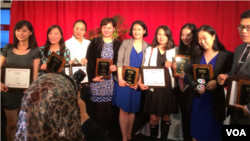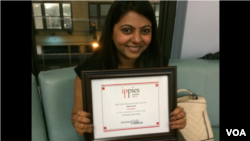NEW YORK —
With hundreds of ethnic and immigrant groups, New York is arguably the most diverse city in the world. Equally varied are the television, radio, print and online media outlets that cater to the 40 percent of Big Apple residents whom the New York Mayor’s office estimates were born abroad.
The 200 or so attendees at the Ippies Awards, where the best of ethnic and community journalism was honored, represented just a fraction of that dazzling palette.
Garry Pierre-Pierre, who directs the City University of New York Graduate School of Journalism’s Center for Community and Ethnic Media, which sponsors the Ippies, said that the ethnic media offer news and information to immigrants and their families about their homelands, and also give immigrants a way to share their perspectives with each other.
“You can get news of the homeland just by going online,” he said, “but sometimes you want to know what the Bangladeshis here think of what’s happening [at home]. The whole thing that is happening in Ukraine: what are the Ukrainian publications, and the Russian publications in Brooklyn, writing about it?”
Community media often chronicle tensions between ethnic groups and mainstream culture.
Fan Bu of Sinovision won an Ippie for her TV story about Chinese-American protests of what they saw as insensitive, or even racist, anti-Chinese comments on a popular American talk show.
“Chinese-Americans are very different from African-Americans, Jewish [and] all the other ethnic groups. Chinese-Americans as a community have had very few protests or uprisings. They rarely voiced their opinions,” she said, smiling while holding the plaque she had received.
“This time,” she said, “Chinese people began to realize that without voicing [their anger], they can never be respected by the mainstream media and the politicians, so they have to stand up for themselves."
Jinal Shah of the South Asia Times wrote a winning article about the challenges she and many other immigrant women face with a H-4 visa. She said that three years ago, her husband was granted a visa allowing him to work in the United States as an engineer. Shah, who was a full-time professional back home, was offered another type of visa that allowed her to accompany her husband as a dependent, but not to work here herself.
“You don’t have the independence that you had back in India. That was frustrating,” she said.
Shah agreed that that situation runs counter to mainstream expectations of an immigrant professional’s new life in America. She said that most people think that when women come to the U.S. from more traditional cultures, they are “liberated.” In her case, though, she said the opposite was true. “But it’s not just limited to Indian-Americans. It’s across all nations, this problem,” adding that she was “glad for the opportunity to write about it.”
Other Ippies honored a story profiling a postpartum center in Queens, a story about the need for police sensitivity to children whose parents are caught up in the legal system, and an audio profile of an Indian-American paraplegic who started a radio station for fellow patients in his long term residential nursing hospital.
Whether the subject matter is public or personal, grand or intimate, timely, topical or merely touching, stories by and about immigrants and ethnic groups will become increasingly relevant to all Americans if, as analysts predict, this already diverse nation becomes even more so.
The 200 or so attendees at the Ippies Awards, where the best of ethnic and community journalism was honored, represented just a fraction of that dazzling palette.
Garry Pierre-Pierre, who directs the City University of New York Graduate School of Journalism’s Center for Community and Ethnic Media, which sponsors the Ippies, said that the ethnic media offer news and information to immigrants and their families about their homelands, and also give immigrants a way to share their perspectives with each other.
“You can get news of the homeland just by going online,” he said, “but sometimes you want to know what the Bangladeshis here think of what’s happening [at home]. The whole thing that is happening in Ukraine: what are the Ukrainian publications, and the Russian publications in Brooklyn, writing about it?”
Community media often chronicle tensions between ethnic groups and mainstream culture.
Fan Bu of Sinovision won an Ippie for her TV story about Chinese-American protests of what they saw as insensitive, or even racist, anti-Chinese comments on a popular American talk show.
“Chinese-Americans are very different from African-Americans, Jewish [and] all the other ethnic groups. Chinese-Americans as a community have had very few protests or uprisings. They rarely voiced their opinions,” she said, smiling while holding the plaque she had received.
“This time,” she said, “Chinese people began to realize that without voicing [their anger], they can never be respected by the mainstream media and the politicians, so they have to stand up for themselves."
Jinal Shah of the South Asia Times wrote a winning article about the challenges she and many other immigrant women face with a H-4 visa. She said that three years ago, her husband was granted a visa allowing him to work in the United States as an engineer. Shah, who was a full-time professional back home, was offered another type of visa that allowed her to accompany her husband as a dependent, but not to work here herself.
“You don’t have the independence that you had back in India. That was frustrating,” she said.
Shah agreed that that situation runs counter to mainstream expectations of an immigrant professional’s new life in America. She said that most people think that when women come to the U.S. from more traditional cultures, they are “liberated.” In her case, though, she said the opposite was true. “But it’s not just limited to Indian-Americans. It’s across all nations, this problem,” adding that she was “glad for the opportunity to write about it.”
Other Ippies honored a story profiling a postpartum center in Queens, a story about the need for police sensitivity to children whose parents are caught up in the legal system, and an audio profile of an Indian-American paraplegic who started a radio station for fellow patients in his long term residential nursing hospital.
Whether the subject matter is public or personal, grand or intimate, timely, topical or merely touching, stories by and about immigrants and ethnic groups will become increasingly relevant to all Americans if, as analysts predict, this already diverse nation becomes even more so.










